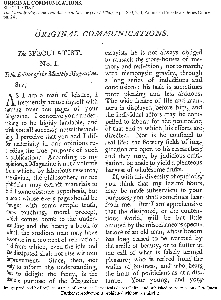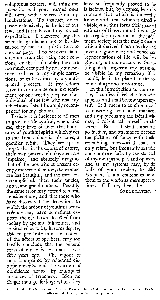 ―241― ―241―
ORIGINAL COMMUNICATIONS.
The SPECULATIST.
No. I.
To the Editor of the Monthly Magazine.
Sir,
AS I am a man of leisure, I
frequently amuse myself with
turning over the pages of your
Magazine. I conceive your under-
taking to be highly laudable, and
wish you all success; notwithstand-
ing, I perceive that you and I dif-
er materially in our opinions re-
specting the true purposes of such
a publication. According to my
opinion, a Magazine is not a volume
from which, by laborious research,
the divine, the philosopher, or the
politician may extract materials to
build some abstruse hypothesis, but
a book whose every page should be
fraught with some simple truth,
some touching, moral precept,
which comes home to the under-
standing and the heart; a book to
which the studious man may have
recourse in a moment of relaxation,
and from which, even the idle and
the dissipated shall not rise without
improvement. Since, then, not
only to inform the understanding,
but to delight the fancy, is the
double purpose of the Magazine
essayist, he is not always obliged
to ransack the store-houses of me-
mory and reflection; not to march,
with metaphysic gravity, through
a long series of inductions and
conclusions: his task is sometimes
more pleasing and less arduous.
The wide theatre of life and man-
ners is displayed before him, and
the individual actors may be com-
pelled to labour for the promotion
of that end to which his efforts are
directed. Nor is he confined to
real life: the flowery fields of ima-
gination are open to his researches;
and they may, by judicious culti-
vation, be made to yield a plenteous
harvest of wholesome fruits.
If, with this diversity of opinions,
you think that my leisure hours.
may be made subservient to your
purposes, you shall sometimes hear
from me. But I am apprehensive
that the dissipated, or the conten-
tious world, will be but little
amused by the miscellaneous specu-
lations of an old man, whose bosom
has long ceased to be warmed by
the smile of beauty, or to flutter at
the call of what is falsely termed
pleasure; who is retired from the
walks of business, and who hears
the hum of politicians as at a dis-
tance. Your young, and your-
 ―242― ―242―
voluptuous readers, will think me
splenetic; and your learned ones
will turn, with a sneer, from my
lucubrations. To instruct, or to
please extensively, is the lot of but
few, and is far beyond my utmost
expectation. I therefore beg the
scientific gentlemen not to be dis-
turbed by me, but quietly turn to
another page. I do not even claim
attention from the vain, the licen-
tious, or the fashionable; they are
too much occupied by noisy amuse-
ment to listen to my simple narra-
tions, or to be edified by my anti-
quated precepts. If my efforts
serve to corroborate one just senti-
ment, or one worthy purpose of an
individual of the few who read my
reflections, I shall be amply recom-
penced for my labours.
Perhaps it is incident to all men
to grow a little cynical, when, like
me, they have outlived that buoy-
ancy of youthful spirits which gives
to social and colloquial pleasures, a
peculiar relish. They are apt to
forget, that in the course of nature,
their own powers of enjoyment are
impaired; and absurdly imagine,
that of the race who at present oc-
cupy the scene of action, the women
are less beautiful, and the men less
accomplished, than their uncles,
aunts, and grandmothers. Possibly
the same error may extend to moral
considerations, and that those who
have discovered the deceptions to
which the ardour of youthful bene-
volence may have sometimes ex-
posed them, who are detached from
society by age and infirmities, and
so situated as to be, in some degree,
able to penetrate into the motives
of the actors or speakers, may too
hastily conclude that the general
mass of virtue is less than it was
fifty years ago. The vigour of
hope is impaired by reiterated dis-
appointments, and the warmth of
confidence abated by multiplied
instances of treachery. Men no
longer indulge feelings which they
have so frequently proved to be
fallacious, but, by degrees, learn to
compare that which is indirectly
known with that which is directly
visible, and thus form their general
estimate of those around them. By
this regular operation of the judg-
ment, society loses the magic charm
which it derived from novelty and
juvenile ignorance; and hence our
representations of life will be less
glowing, but more accurate. Some-
thing of this asperity may, at times,
be visible in my remarks; if it
should, let it be placed to the ac-
count of age and misfortune.
In this introduction to your no-
tice, I confess I feel at a loss what
appellation I shall bestow upon my-
self. If I mean to confine myself
to observing men and manners,
and simply relating the facts I wit-
ness, I might call myself an ob-
server. But as I shall sometimes
go further, and attempt to decorate
the pictures of fancy with truth-
resembling hues—as I shall not
only relate, but frequently examine
and compare facts by the standard
of my own principles and opinions,
and as my systems may, by the
bulk of your readers, be stiled
Utopian, I am content to usher
them to the world as mere specula-
tions. Call me, then, the
SPECULATIST.
|